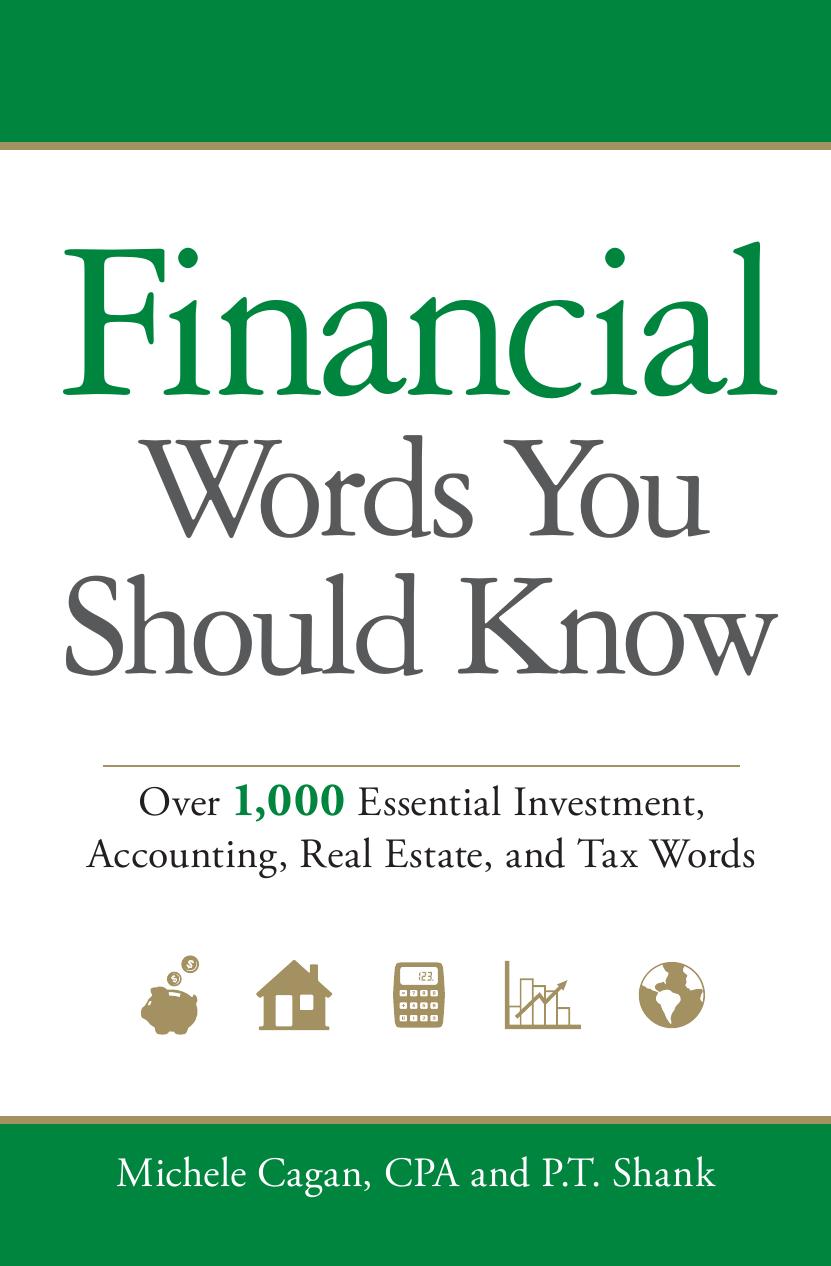Financial Words You Should Know by Michele Cagan

Author:Michele Cagan
Language: eng
Format: epub, pdf
Tags: ebook, book
Publisher: F+W Media
Published: 2009-02-21T16:00:00+00:00
INVESTING
2% stop
A preset limit on the dollar amount an investor is willing to lose on an investment. Usually refers to a percentage of his entire portfolio, converted into dollars. For example, a 2% stop on a $200,000 portfolio means the investor would sell any security whose price declined by $4,000. Sometimes called a “money stop.”
See also: Stop order, Trailing stop
In order to help control losses, Zach made sure his broker always knew where his 2% stop was set.
52-week high
The top price for which a security has traded over the past year.
See also: Record high
Eric was lucky to have sold his stocks at their 52-week high.
52-week low
The lowest price for which a security has traded over the past year.
See also: Record low
Sandra assured her clients that the 52-week low was still more than they had paid for the securities. In spite of the drop, they were still making money.
Above the market
An order to buy or sell a security at a price that’s higher than the prevailing trade price. Often used when a trader expects a stock to break through resistance and go on an uptrend, in order to get in at the start of that uptrend.
See also: Resistance, Uptrend
The speculator told his broker to buy above the market because he expected prices to rise in the next few months.
Absolute Breadth Index (ABI)
A measure of the movement and volatility of the New York Stock Exchange (though it can be used to measure any exchange), regardless of which direction the market is moving. It is the difference between the number of advancing and declining issues. The larger the difference, the higher the market volatility, which may indicate a rollercoaster ride in the upcoming weeks.
See also: Advance/decline line, Breadth indicator
Investors held their breath as the ABI started increasing because they knew the market was going to start fluctuating rapidly.
Absolute return
The actual earnings on an investment.
See also: Relative return
Even after fees and taxes, Todd was pleased with the absolute return on his mutual fund.
Accredited Investor
A person or entity (such as a bank or corporation) that is allowed, under securities laws, to invest in extremely high-risk investments. Defined under the Securities Act of 1933; to qualify as an accredited investor a person must either have a net worth (either on her own or combined with her spouse) of more than $1 million at the time she invests or have more than $200,000 income ($300,000 if it’s joint income with a spouse) in each of the past two years and reasonably expect to continue earning at the same income level.
See also: Institutional investor
Since Gina earned $225,000 per year for the past two years, she qualified as an accredited investor.
“Across the board”
A phenomenon where most market activity moves in the same direction, a market-wide movement.
See also: Big board, Stock market
Since the crash of 1929, there have been safeguards to avoid an “across the board” drop from causing another depression.
Actuals
Physical goods that are interchangeable with other goods of the same type, such as sugar, corn, precious metals, and oil. Also called “commodities.
Download
Financial Words You Should Know by Michele Cagan.pdf
This site does not store any files on its server. We only index and link to content provided by other sites. Please contact the content providers to delete copyright contents if any and email us, we'll remove relevant links or contents immediately.
Periodization Training for Sports by Tudor Bompa(8272)
The Body: A Guide for Occupants by Bill Bryson(5096)
The MacArthur Bible Commentary by John MacArthur(4826)
The Sports Rules Book by Human Kinetics(4386)
What It Really Takes to Get Into Ivy League and Other Highly Selective Colleges by Hughes Chuck(3760)
Marijuana Grower's Handbook by Ed Rosenthal(3683)
The Sprouting Book by Ann Wigmore(3592)
The Martian by Andy Weir(3427)
Salt, Fat, Acid, Heat: Mastering the Elements of Good Cooking by Nosrat Samin(3147)
Harry Potter 4 - Harry Potter and The Goblet of Fire by J.K.Rowling(3073)
Sapiens and Homo Deus by Yuval Noah Harari(3071)
The Bread Bible by Rose Levy Beranbaum(3069)
The Marketing Plan Handbook: Develop Big-Picture Marketing Plans for Pennies on the Dollar by Robert W. Bly(3062)
Classic by Mary Berry(3012)
Martha Stewart's Baking Handbook by Martha Stewart(2860)
Screenplay: The Foundations of Screenwriting by Syd Field(2642)
The Plant Paradox by Dr. Steven R. Gundry M.D(2620)
50 Economics Classics by Tom Butler-Bowdon(2571)
The Cambridge Grammar Of The English Language by Rodney Huddleston Geoffrey K. Pullum(2430)
